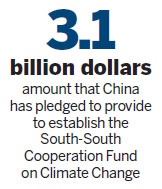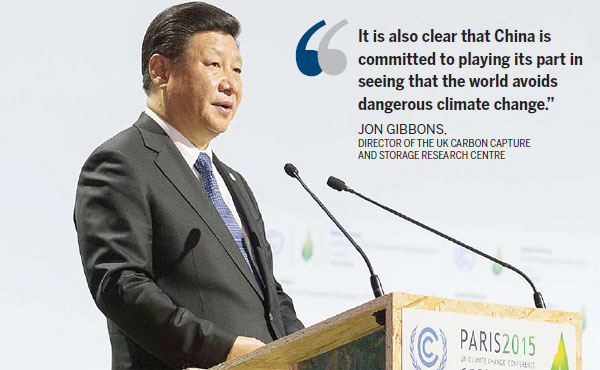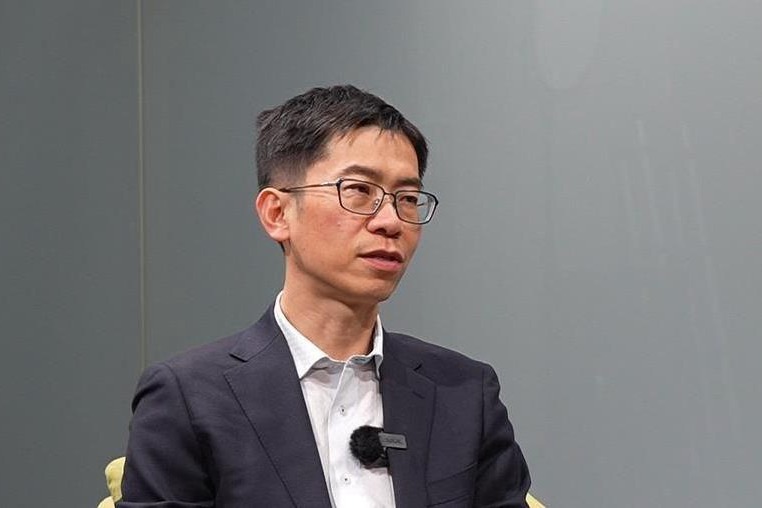Xi: Reject zero-sum mindset





President calls on developed world to honor commitments on climate change
President Xi Jinping, addressing world leaders at the Paris climate conference, urged them to abandon a zero-sum mindset in battling the global climate threat and achieve a historic agreement to reduce Earth's carbon emissions after 2020.
"The Paris conference should reject the narrow-minded mentality of a zero-sum game," said Xi, adding that the Paris conference should yield positive and practical results with a comprehensive, balanced, ambitious and binding agreement.
| President Xi Jinping addresses world leaders at the Paris climate conference on Nov 30. Huang Jingwen / Xinhua |
Xi spoke at the opening of the talks, held in a climate of tightened security, in the presence of up to 150 global leaders including US President Barack Obama, who met with Xi and also issued two joint presidential statements last year and in September to solidify the consensus among the world's two biggest economies and carbon emitters.
Observers say while Xi and other global leaders have strengthened their commitments, they have entrusted their negotiation teams with flexibility and room to compromise to achieve a deal. All parties need to accept the agreement, they say, even if it is not satisfying to all, which is normal in any international negotiation.
A final agreement will be reached on Dec 11 if talks progress apace, while a draft text should be ready on Dec 4.
In his 10-minute address, Xi also said that tackling climate change is a shared mission for mankind and that global efforts on climate change are like a mirror reflecting a model for future global governance.
The principle of "common but differentiated responsibilities" should be adhered to, the president said, and the conference should create a win-win future, with each country contributing to the best of its ability and with countries being allowed to seek their own solutions.
Xi has joined other leaders in trying to break the deadlock on financing in the UN climate negotiations and to bring real money to the table, while urging rich countries to honor a commitment to finance a $100 billion climate fund each year by 2020 and to provide strong support for developing countries afterward.
It's also important that climate-friendly technology is transferred to developing countries, he said.
China has pledged to provide 20 billion yuan ($3.1 billion; 2.9 billion euros) to establish the South-South Cooperation Fund on Climate Change to support other developing countries in coping with climate change.
Xi also said ecological projects would be featured prominently in China's 13th Five-Year Plan (2016-20). He says China would help developing countries set up 10 low-carbon pilot zones starting next year.
Dennis Pamlin, founder of the Sweden-based consultancy 21st Century Frontiers, says Xi has set an example for other global leaders in expressing their climate commitments.
"Xi's call to abandon a zero-sum mindset worldwide, if others have heard and take action, is perhaps the most important change that must happen in global climate work," Pamlin says.
That would require the world to rethink many of its current tools and governance structures, from offsets to carbon taxes, and also to challenge many of the old polluting companies that today are very reluctant to reduce emissions, he says.
"We need to focus more on companies that see reduced emissions as a business opportunity. Citizens should be the focus, not old companies, unless they can show how they help citizens live better lives with zero emissions in the near future," Pamlin says.

Samantha Smith, leader of the World Wildlife Fund's Global Climate and Energy Initiative, also says Xi's call is a good reminder that all governments need to recognize that climate change is a global crisis and requires a collective and global effort.
"If countries only consider their own national interests and are not willing to compromise, this will only result in a winners-losers scenario, which is not in the interest of the common future of humanity and the planet," Smith says.
As for Xi's call for developed countries to honor their commitments to help poor countries, Pamlin says there are two barriers.
One is that many countries today are in a difficult economic situation. "The second barrier is a tactical one. Developed countries feel that as soon as they pay something, there are many other things that developing countries will ask for," he says.
"As developed countries have not done a good job in delivering on their promises, tech transfer and better trade policies in relation to developing countries, they want to wait as long as possible to focus the negotiations around a relatively simple issue."
Pamlin says China's leadership in South-South cooperation is very promising and if the quality of the projects is high, this should provide a role model for global cooperation.
"It is clear that China now has a central role to play and is willing to take bold and necessary actions. With focus on the positive opportunities while recognizing the need to reach the necessary reductions, China has a very good approach," Pamlin says. "How this will be followed up during the G20 presidency will be interesting to see."
Smith also says it is clear that without the fulfillment of commitments made by developed countries, including the financial commitments, trust between countries will not be built. Thus far, she says the $100 billion commitment has not been met, and without this happening it would be difficult for developing countries to believe that commitments in the new agreement for financing after 2020 will be met.
Smith also says that announcements on South-South cooperation by China are an important signal that developing countries with the capacity to do so will provide support to other developing countries to deal with climate change and the transition to a low-carbon sustainable future. This kind of solidarity and collective action is critical now.
"We believe that all high-level signals from leaders committing to address climate change are critical in this period of urgency," she says. "President Xi's statements of commitment to reaching an agreement in Paris are an important contribution to creating the political momentum and will, and should, help encourage other leaders to be ambitious and part of the collective efforts to deal with climate change."
Jon Gibbons, director of the UK Carbon Capture and Storage Research Centre, says China is well placed to take a leading role in global cooperation between developed and developing countries to fight climate change using carbon capture and storage, based on its impressive power plant construction industry.
"It is also clear that China is committed to playing its part in seeing that the world avoids dangerous climate change - this is essential to preserve the well-being of people in China just as much as in countries where development has occurred earlier," Gibbons says.
Jennifer Morgan, global director of the climate program at the World Resources Institute, says Xi showed his resolve to addressing climate change.
"His comments show that China is ready to step into a pivotal role in reaching common ground on key issues here in Paris," she says. "Xi embraced China's role as the largest emerging economy to help developing countries tackle climate change via South-South cooperation, providing financial, technological and capacity-building support."
Michael Schack, project leader of heating and cooling networks and cogeneration for French energy company Engie, says other global leaders should follow China's example to inject more concrete political will to achieve a Paris deal.
Jean-Pierre Lafon, French ambassador to China, says he has seen tremendous changes in China in improving environmental and climate awareness and technology breakthroughs. "China has taken firm action in tackling pollution and climate threat," he says.
Tom Jennings of the Carbon Trust says climate change is a global problem that needs global solutions and thinking only about national interests will not deliver the urgent progress that is required to limit warming to an average of no more than 2 C.
"Xi is right to highlight the importance of developed nations helping developing nations through providing finance to invest in addressing climate change," says Jennings. "China is already a world leader in a number of clean technologies, so it has an important part to play in bringing down the cost of clean energy."
Contact the writers through fujing@chinadaily.com.cn
(China Daily European Weekly 12/04/2015 page3)
Today's Top News
- Japan tempting fate if it interferes in the situation of Taiwan Strait
- Stable trade ties benefit China, US
- Experts advocate increasing scope of BRI to include soft power sectors
- New engine powers cargo drone expansion
- China to boost green industry cooperation
- Manufacturing PMI rises in November



























